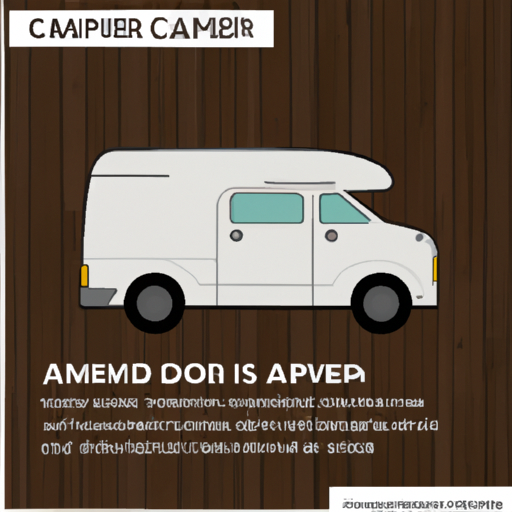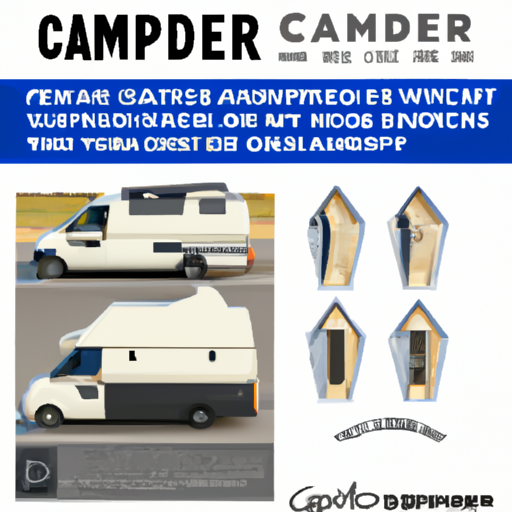Are you in the exciting process of converting a van into a cozy camper? Wondering what type of paneling would be the perfect fit for your new home on wheels? Look no further! In this article, we will explore the various options available for paneling your camper van. From natural wood to lightweight materials, we will discuss the pros and cons of each, helping you make an informed decision. So, let’s get started on finding the best paneling for your camper van!
What Is The Best Paneling For A Camper Van?
When it comes to choosing the paneling for your camper van, there are a variety of options available. Each type of paneling has its own unique features, advantages, and disadvantages. In this article, we will explore different paneling options commonly used in camper vans and discuss their pros and cons to help you make an informed decision.
1. Wood Paneling
1.1 Types of Wood Paneling
Wood paneling is a classic choice for camper van interiors due to its natural beauty and warmth. There are various types of wood paneling available, including plywood, reclaimed wood, and tongue and groove boards.
1.2 Advantages of Wood Paneling
One of the major advantages of wood paneling is its aesthetic appeal. Wood adds a cozy and rustic feel to the interior of a camper van, creating a welcoming atmosphere. Additionally, wood is relatively easy to work with, allowing for customization and personalization.
Wood paneling also provides good insulation, helping to keep the interior of your camper van warm in colder climates. It is durable and long-lasting, making it a reliable option for camper van conversions.
1.3 Disadvantages of Wood Paneling
While wood paneling offers many benefits, it does have some drawbacks to consider. One of the main disadvantages is its weight. Wood is heavier compared to other paneling options, which can increase the overall weight of your camper van.
Wood paneling also requires regular maintenance to prevent warping, rot, and discoloration. It is susceptible to moisture damage, making it important to properly seal and protect the wood to prolong its lifespan.

2. Fiberglass Panels
2.1 Benefits of Fiberglass Panels
Fiberglass panels are a popular choice for camper van conversions due to their durability and lightweight nature. These panels are made from woven fiberglass cloth and a strong resin, resulting in a sturdy and weather-resistant material.
One major advantage of fiberglass panels is their lightweight construction. Using fiberglass panels can help reduce the weight of your camper van, which in turn can improve fuel efficiency and overall handling.
Fiberglass panels are also resistant to moisture, making them ideal for camper vans that may be exposed to humid or wet conditions. They are easy to clean and maintain, requiring minimal effort to keep them looking good as new.
2.2 Limitations of Fiberglass Panels
While fiberglass panels offer several benefits, there are a few limitations to consider. Fiberglass can be more expensive compared to other paneling options, which may impact your budget for the camper van conversion.
Fiberglass panels may also require additional insulation, as they are not as effective at insulating against temperature changes as other materials. This added insulation can increase the overall cost and complexity of the conversion.
3. Aluminum Panels
3.1 Advantages of Aluminum Panels
Aluminum panels are a lightweight and durable option for camper van paneling. They are resistant to corrosion and weather damage, making them suitable for outdoor adventures.
One of the major advantages of aluminum panels is their strength-to-weight ratio. They are relatively lightweight while being strong and rigid, making them an excellent choice for camper van conversions.
Aluminum panels are also easy to clean and maintain, requiring minimal effort to keep them looking their best. They can withstand harsh conditions and are not prone to warping or rotting like some other paneling materials.
3.2 Drawbacks of Aluminum Panels
Despite its many advantages, aluminum paneling has a few drawbacks to consider. One of the main disadvantages is its lower insulation properties compared to other materials. Without additional insulation, aluminum paneling may not provide sufficient temperature regulation in extreme climates.
Aluminum panels can also be more expensive compared to some other paneling options. The cost of the material itself as well as the installation process can be higher, potentially impacting your overall budget for the camper van conversion.

4. Composite Panels
4.1 Features of Composite Panels
Composite panels are made from a combination of materials, usually including wood fibers or particles bonded with a resin or glue. This results in a strong and versatile paneling option for camper vans.
Composite panels offer a range of features that make them a popular choice. They are lightweight, durable, and resistant to moisture, making them suitable for various climates and outdoor use. These panels are also available in a wide range of designs and finishes, allowing for customization to suit your style preferences.
4.2 Pros of Composite Panels
One of the major advantages of composite panels is their strength and durability. They are resistant to cracking, warping, and rotting, making them a reliable choice for the interior of a camper van. Composite panels also offer good insulation properties, helping to maintain a comfortable temperature inside the vehicle.
Composite panels are relatively easy to install and work with, making them suitable for DIY camper van conversions. They are available in various sizes and thicknesses, allowing for flexibility in design and construction.
4.3 Cons of Composite Panels
While composite panels offer many benefits, there are some limitations to consider. The cost of composite panels can be higher compared to other paneling materials, which may impact your budget for the conversion. It is also important to choose high-quality composite panels to ensure their longevity and performance.
Composite panels may require additional sealing or finishing to protect them from moisture damage. If not properly sealed, the panels may be susceptible to swelling and delamination over time.
5. PVC Wall Panels
5.1 Advantages of PVC Wall Panels
PVC wall panels are a popular choice for camper van conversions due to their affordability and versatility. These panels are made from PVC (polyvinyl chloride), a lightweight and durable material.
One major advantage of PVC wall panels is their affordability. They are often more budget-friendly compared to other paneling options, making them a cost-effective choice for camper van conversions. PVC wall panels are also easy to clean and maintain, requiring minimal effort to keep them looking clean and fresh.
5.2 Disadvantages of PVC Wall Panels
While PVC wall panels offer affordability and low maintenance, there are a few disadvantages to consider. PVC is not as sturdy as some other materials, making it more prone to damage from impacts or heavy use. It may also not provide as much insulation as other paneling options, requiring additional insulation for temperature regulation in extreme climates.
PVC is also not a biodegradable material, which can raise concerns for those looking for environmentally-friendly options for their camper van conversions.
6. Fiberglass Reinforced Panels
6.1 Advantages of Fiberglass Reinforced Panels
Fiberglass reinforced panels, also known as FRP, are made from a combination of fiberglass and a polymer resin. These panels offer a range of advantages that make them suitable for camper van conversions.
One major advantage of FRP panels is their durability and resistance to impact. They can withstand heavy use and are less prone to denting or scratching compared to some other materials. FRP panels are also lightweight, making them an ideal choice for camper van conversions where weight is a consideration.
FRP panels are highly resistant to moisture, making them suitable for use in wet or humid environments. They are easy to clean and maintain, requiring minimal effort to keep them in good condition.
6.2 Disadvantages of Fiberglass Reinforced Panels
While FRP panels have many benefits, there are a few limitations to consider. These panels can be more expensive compared to some other paneling options, which may impact your budget for the camper van conversion.
FRP panels may also require additional insulation for temperature regulation, as they are not as effective at insulating against temperature changes as some other materials. This added insulation can increase the overall cost and complexity of the conversion.
7. Insulated Panels
7.1 Benefits of Insulated Panels
Insulated panels offer excellent thermal insulation properties, making them suitable for camper vans that will be used in a variety of climates. These panels consist of a core material, such as foam or polystyrene, sandwiched between two outer layers.
One of the major advantages of insulated panels is their insulation capability. They can help keep the interior of your camper van cooler in hot weather and warmer in cold weather, reducing the need for additional heating or cooling systems.
Insulated panels are also lightweight and easy to install, making them suitable for DIY camper van conversions. They provide good sound insulation, reducing noise pollution from the outside environment.
7.2 Limitations of Insulated Panels
Despite their benefits, insulated panels do have a few limitations to consider. The cost of insulated panels can be higher compared to some other paneling options, which may impact your budget for the conversion.
Insulated panels may also require additional sealing or finishing to protect them from moisture damage. If not properly sealed, the panels may be susceptible to swelling or delamination over time.

8. Vinyl Panels
8.1 Advantages of Vinyl Panels
Vinyl panels are a versatile and affordable option for camper van paneling. These panels are made from PVC (polyvinyl chloride) and offer a range of benefits for camper van conversions.
One major advantage of vinyl panels is their affordability. They are often more budget-friendly compared to other paneling options, making them a cost-effective choice. Vinyl panels are also lightweight and easy to install, making them suitable for DIY conversions.
Vinyl panels are highly resistant to moisture, making them a suitable choice for camper vans that may be exposed to wet or humid conditions. They are easy to clean and maintain, requiring minimal effort to keep them looking their best.
8.2 Drawbacks of Vinyl Panels
While vinyl panels offer affordability and low maintenance, there are a few drawbacks to consider. Vinyl is not as sturdy as some other materials, making it more prone to damage from impacts or heavy use. It may also not provide as much insulation as other paneling options, requiring additional insulation for temperature regulation in extreme climates.
Vinyl is also not as environmentally-friendly as some other materials, as it is made from PVC, which is not biodegradable.
10. Polycarbonate Panels
10.1 Benefits of Polycarbonate Panels
Polycarbonate panels are a durable and transparent option for camper van paneling. These panels are made from a thermoplastic material known for its strength and impact resistance.
One major advantage of polycarbonate panels is their durability. They are highly resistant to impact, making them suitable for camper vans that may be exposed to rough conditions or potential accidents. Polycarbonate panels also provide good thermal insulation, helping to regulate the temperature inside the vehicle.
Polycarbonate panels are lightweight and easy to install, making them suitable for camper van conversions. They allow natural light to enter the interior, creating a spacious and bright atmosphere.
10.2 Limitations of Polycarbonate Panels
While polycarbonate panels offer many benefits, there are a few limitations to consider. These panels can be more expensive compared to some other paneling options, which may impact your budget for the camper van conversion.
Polycarbonate panels may require additional sealing or finishing to protect them from UV damage and discoloration. Without proper protection, the panels may become brittle or lose their transparency over time.
In conclusion, choosing the best paneling for a camper van involves considering factors such as aesthetics, weight, insulation properties, durability, and budget. Wood paneling offers a classic and cozy look, but it can be heavier and require more maintenance. Fiberglass panels are lightweight and weather-resistant, but they may require additional insulation. Aluminum panels provide strength and resistance to weather damage, but they may be pricier and have lower insulation properties. Composite panels offer a combination of strength and customization options, but they can be more expensive and require proper sealing. PVC wall panels are affordable and easy to maintain, but they may not be as sturdy or environmentally-friendly. Fiberglass reinforced panels are durable and impact-resistant, but they can be more expensive and require additional insulation. Insulated panels provide excellent thermal insulation, but they may be costlier and require sealing for moisture protection. Vinyl panels are affordable and lightweight, but they may lack insulation and be less eco-friendly. Finally, polycarbonate panels offer durability and transparency, but they can be pricier and require protection against UV damage and discoloration. Consider your specific needs and preferences when choosing the best paneling for your camper van conversion.


